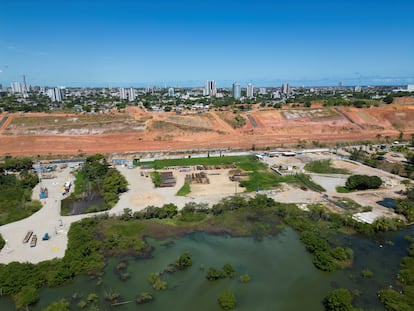Brazil fines petrochemical company $13.5 million for mining under Maceio, a sinking city
Neighborhoods in the city of Maceio are threatening to collapse due to the company’s decades-long extraction of rock salt


Brazil has fined petrochemical company Braskem 72 million reais ($13.5 million) for environmental damage in the northeastern city of Maceio. The fine — imposed on Tuesday by the Environment Institute of the State of Alagoas — concerns damage caused to five neighborhoods in Maceio, which are at risking of disappearing into a giant hole.
Brazil is very aware of the speed at which the ground is sinking. Movement has slowed — 6.3 centimeters on Monday — but the danger remains, according to authorities. The thousands of homes in the area have been uninhabited since 2019, a year after geologists determined that the sinking was due to Braskem’s decades-long mining activity. The company — the sixth-largest in the sector worldwide — has failed to comply with the order to fill in the mine to stabilize the ground, the Brazilian newspaper O Globo reported Tuesday.
The problem, which affects a fifth of the land of Maceio, dates back five years. The residents of the 14,000 homes directly affected were evicted years ago, when the area began to sink in 2018. The five neighborhoods that existed above the mine are now a ghost town. The issue was considered local news, but made national headlines last Friday after several seismic movements accelerated the sinking process. “Maximum alert for the imminent risk of collapse,” was the unequivocal warning made by authorities.
The mayor of Maceio said over the weekend that the effects of a total collapse were impossible to determine because it would be “an unprecedented event in the world.” The crisis came as Brazilian President Luiz Inácio Lula da Silva was at the COP28 climate summit in Dubai, on a visit to present Brazil as the great protector of the Amazon rainforest and a pioneer in the fight against the climate emergency.
Brazil’s Minister of Environment and Climate Change, Marina Silva, criticized Braskem for its “disastrous activity” in Maceio, the capital of Alagoas state. According to the newspaper Folha, Silva said that Braskem holds “total responsibility” for the crisis. She added that environmental authorization processes need to be rigorous as any easing of the rules could lead to catastrophic effects, as demonstrated by the situation in Maceio.
The crisis in Maceio has put Braskem under the spotlight. The company, which is listed on the stock exchange, has 8,000 employees and clients in more than 70 countries around the world. It failed to fulfill its own plans to begin filling the mine galleries with sand to stabilize the ground. This process was scheduled to start on November 25, but no action was taken. Four days later, a succession of seismic movements accelerated the sinking and set off alarm bells. The filling process, which the company has carried out in other mines, was going to take 18 months to complete.
Given the worsening of the crisis, the federal and state prosecutor’s office has presented a new lawsuit demanding that Braskem and the City Council provide 1,000 million reais ($200 million) to address the environmental risk. It also calls on Braskem to compensate more families.
Braskem had a stand at COP28, where it presented itself as an environmentally friendly company. But it hastily shut it down after the crisis in Maceio made headlines. The general director of the multinational, Roberto Bishoff, said Monday in São Paulo that the company is committed to resolving this matter “without putting people at risk.” Without going into details, he blamed the crisis on “political interests that end up creating distorted information, [on] social networks.”
Experts from the Brazilian Geological Service ruled in 2019 that the land was sinking due to the activities of Braskem, which for almost half a century drilled in an area of Maceio that was home to almost 60,000 people. The company extracted rock salt, which is used to manufacture caustic soda and PVC. Since then, it has sunk 1.8 meters.
The agency of the Mining Ministry that oversees the sector’s activities ordered the company to stop extracting rock salt and close the affected mines. It took two years to develop a project that, according to O Globo, was initially only going to seal the entrance to the mine. The company changed its plans after realizing that the cavity was depressurized and decided to fill the almost half a million cubic meters of galleries with sand. But as the mine sunk, the volume that needed to be filled was reduced.
Sign up for our weekly newsletter to get more English-language news coverage from EL PAÍS USA Edition
Tu suscripción se está usando en otro dispositivo
¿Quieres añadir otro usuario a tu suscripción?
Si continúas leyendo en este dispositivo, no se podrá leer en el otro.
FlechaTu suscripción se está usando en otro dispositivo y solo puedes acceder a EL PAÍS desde un dispositivo a la vez.
Si quieres compartir tu cuenta, cambia tu suscripción a la modalidad Premium, así podrás añadir otro usuario. Cada uno accederá con su propia cuenta de email, lo que os permitirá personalizar vuestra experiencia en EL PAÍS.
¿Tienes una suscripción de empresa? Accede aquí para contratar más cuentas.
En el caso de no saber quién está usando tu cuenta, te recomendamos cambiar tu contraseña aquí.
Si decides continuar compartiendo tu cuenta, este mensaje se mostrará en tu dispositivo y en el de la otra persona que está usando tu cuenta de forma indefinida, afectando a tu experiencia de lectura. Puedes consultar aquí los términos y condiciones de la suscripción digital.








































